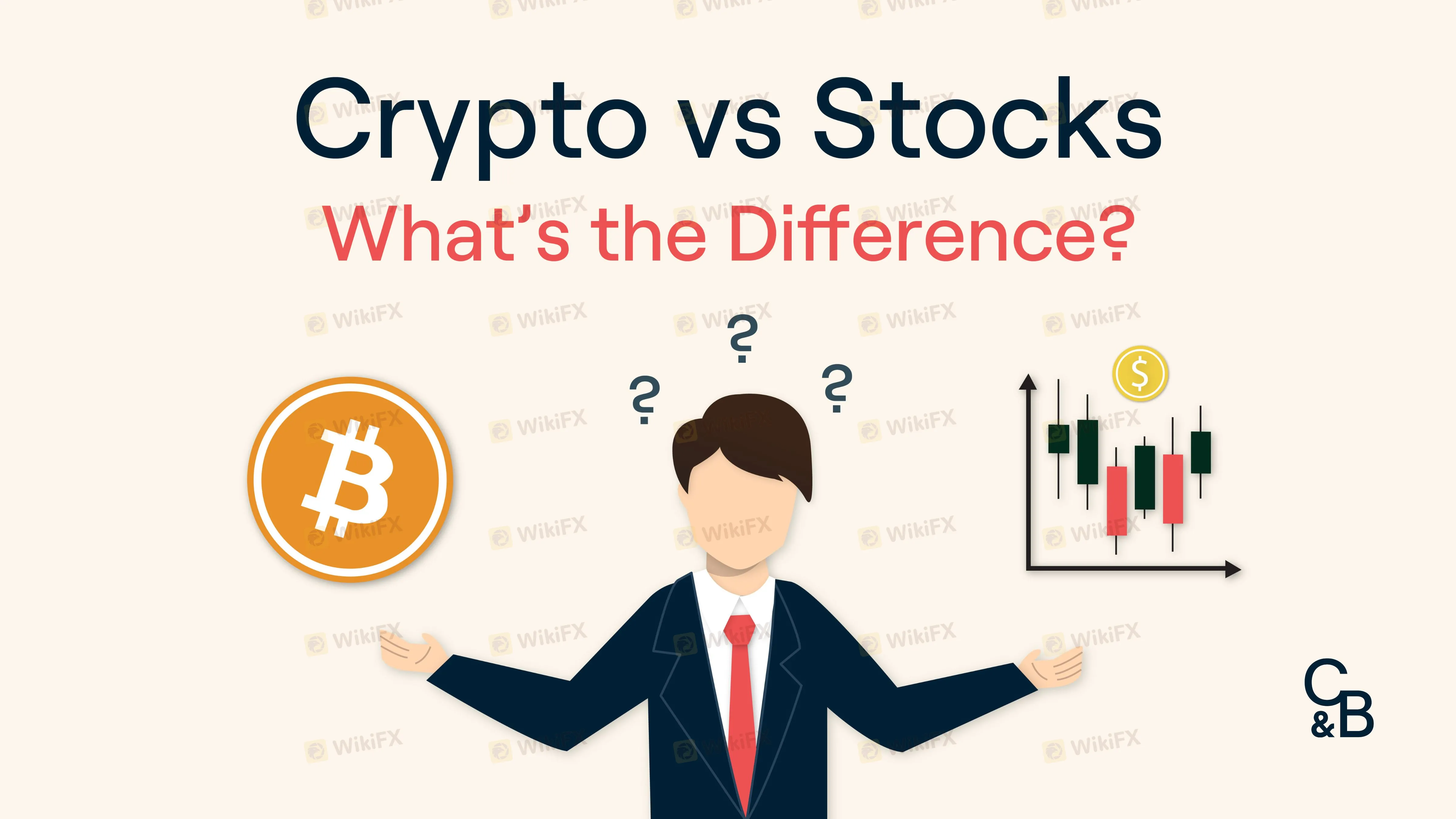简体中文
繁體中文
English
Pусский
日本語
ภาษาไทย
Tiếng Việt
Bahasa Indonesia
Español
हिन्दी
Filippiiniläinen
Français
Deutsch
Português
Türkçe
한국어
العربية
What Is the Difference between Crypto and Stocks? And Which Choose to Trade?
Abstract:The latest cryptocurrency boom and bust cycle contrasts sharply with stocks' stable trend. While lesser-known cryptocurrencies like Dogecoin momentarily experienced a 100-fold increase before plummeting equally rapidly, Bitcoin's market capitalisation surged to over $1.4 trillion in 2024.
What Is the Difference between Crypto and Stocks?
The latest cryptocurrency boom and bust cycle contrasts sharply with stocks' stable trend. While lesser-known cryptocurrencies like Dogecoin momentarily experienced a 100-fold increase before plummeting equally rapidly, Bitcoin's market capitalisation surged to over $1.4 trillion in 2024. These erratic fluctuations emphasise how cryptocurrency is a high-risk, high-reward investment. In the meantime, firms like Apple and Microsoft maintain their dominance of the worldwide market—not through marketing, but through steady revenues and useful products. Even while they are susceptible to downturns, their valuations are still grounded in actual economic activity.At their core, these assets run on completely different systems. Cryptocurrencies rely on blockchain technology to create decentralized networks in which prices fluctuate based on computer-driven mining algorithms and human market psychology. Stocks, by contrast, reflect ownership of a real business. Their performance depends on tangible factors such as quarterly earnings reports, competitive pressures in sectors such as technology or health care, and central bank decisions. While cryptocurrency enthusiasts believe blockchain could revolutionize finance, stocks have a good track record: they power everything from retirement savings to national economies.

Highlights
Cryptocurrencies are virtual transactional currencies based on blockchain technology. Stocks, however, represent ownership in a company, granting shareholders the right to share in the company's assets and earnings. Both are influenced by market supply and demand.
Stocks: Traded on regulated and mature exchanges, with the potential to earn dividends as a share of the company's profits.
Cryptocurrencies: Traded globally on a 24/7 basis, with no dividend payments, and subject to varying regulations across different countries.
In terms of risk and return, cryptocurrencies are highly volatile, which offers the potential for high returns but also carrying significant risks. Stocks, by contrast, tend to have lower volatility, with prices typically tied to financial performance metrics such as earnings reports, and they are more suitable for long-term and stable investments.
Crypto vs Stocks: Key Differences and Similarities
| Attribute | Stocks | Cryptocurrencies |
| Asset | Represents ownership in a company | Digital or virtual currency using cryptographic technology |
| Value | Tied to company financial performance | Driven by market speculation and supply-demand dynamics |
| Dividends | May offer dividends | No dividends |
| Regulation | Strictly regulated | Varies globally (decentralized frameworks) |
| Trading Hours | Set exchange hours | 24/7 global trading |
| Market Maturity | Highly developed | Relatively new/nascent |
| Voting Rights | May include voting rights | Crypto tokens may offer voting rights (if designed) |
| Utility | Primarily for investment/ownership | Investment, trading, or enabling smart contracts |
| Tangibility | Intangible but represents tangible entities | Intangible (digital-only) |
Concept and underlying technology
Conceptually, the two are completely different concepts. A stock represents a company's equity, is a claim on the company's assets and earnings, and is closely linked to real business activities in the real world.
Cryptocurrencies are a relatively recent innovation. They are digital or virtual currencies secured through cryptography and built on blockchain technology - a decentralized ledger system used to verify and record transactions. Each cryptocurrency has a specific purpose in its native ecosystem as a medium of exchange, store of value, or utility token.
Volatility and risk factors
Cryptocurrencies are much more volatile than stocks. Its price can fluctuate wildly from day to day, often driven by speculative trading and investor sentiment rather than the actual performance of the company. Slow trading can also be a problem for some traders. The surge in cryptocurrency prices could also soon collapse.
Finally, there is the issue of security. What if your cryptocurrency brokerage gets hacked or goes bankrupt? What if you download your cryptocurrency assets to a secure local wallet and forget your password? These are common dangers that cause many cryptocurrency investors to lose money.
In contrast, stocks are less volatile and their valuations are closely tied to company earnings. Although stock prices fluctuate with the economic cycle, they usually rise and fall less than cryptocurrencies. However, stocks are not entirely risk-free - market downturns, poor management or changing industry trends can affect their value.
Market structure and regulation
The stock market is heavily regulated, has a structured framework of operation, and operates through reputable exchanges such as the New York Stock Exchange (NYSE) or the London Stock Exchange (LSE). Numerous rules protect investors and require companies to disclose accurate financial information on a regular basis.
In contrast, the cryptocurrency market is less regulated and more decentralized. While some countries have begun to establish regulatory frameworks, others have banned cryptocurrency trading altogether. The absence of uniform global regulation is associated with a higher risk of fraud or manipulation.
Should You Invest in Cryptocurrencies or Stocks?
Any savvy investor must know exactly what theyre investing in. Weighing the risks and rewards of investments and understanding what drives success is critical. Without such clarity, it becomes gambling, not investing. Below are key considerations for investors evaluating stocks and cryptocurrencies.
Stocks
Stocks represent partial ownership in a company. It‘s easy to overlook this when fixated on volatile prices and potential profits. As legitimate claims on a business’s assets and cash flows, stocks entitle shareholders to a share of its success. This underpins your investment and determines its valuation.

Why Stocks Rise or Fall: Stock prices fluctuate based on investor assessments of a company‘s future performance. While short-term optimism can inflate valuations, prices ultimately hinge on a company’s ability to grow profits over time. Long-term stock gains stem from the underlying businesss success. For stocks to succeed, the company must thrive over the long haul.
Cryptocurrencies
Most cryptocurrencies lack hard asset backing (exceptions include stablecoins like USDT). Popular ones like Bitcoin and Ethereum exemplify this. Cryptocurrencies may enable functions like remittances or executing smart contracts—self-executing agreements triggered by predefined conditions.

Why Cryptos Rise or Fall: With no assets or cash flows to anchor value, crypto prices are driven purely by speculative sentiment. Shifts in hype can trigger dramatic swings. Essentially, crypto gains rely on the “Greater Fool Theory”: the belief that someone will later buy at a higher price than you paid. For crypto to succeed, the market must collectively agree its worth more than you paid—a perpetual optimism race.
The Bottom Line: Stocks anchor value in tangible businesses; crypto bets on intangible speculation. One is ownership; the other is a confidence game.
Final Thoughts: Cryptocurrencies vs. Stocks
Cryptocurrencies and stocks are fundamentally different — the former represents high-risk, high-volatility speculative instruments with prices capable of extreme swings overnight, suitable only for small allocations with strict stop-loss mechanisms. The latter is a value-driven investment rooted in tangible economic fundamentals, where long-term holding of quality company shares allows participation in economic growth dividends.
Investors should allocate 80%-90% of capital to well-established, cash-flow-positive blue-chip stocks, and use the remaining 10%-20% for crypto experimentation. Remember: while cryptocurrencies carry the potential for total loss, equity in strong businesses appreciates alongside societal progress. Regardless of your choice, always use spare funds and ensure you can withstand worst-case scenarios.
Disclaimer:
The views in this article only represent the author's personal views, and do not constitute investment advice on this platform. This platform does not guarantee the accuracy, completeness and timeliness of the information in the article, and will not be liable for any loss caused by the use of or reliance on the information in the article.
WikiFX Broker
Latest News
Is Your Forex Strategy Failing? Here’s When to Change
FSMA Warns That Some Firms Operate as Pyramid Schemes
Apex Trader Funding is an Unregulated Firm | You Must Know the Risks
Sigma-One Capital Scam? Investors Say They Can’t Withdraw Funds
Federal Reserve likely to hold interest rates steady despite pressure from Trump. Here's what that means for your money
WEEKLY SCAM BROKERS LIST IS OUT! Check it now
Intel drops 9% as chipmaker's foundry business axes projects, struggles to find customers
Palantir joins list of 20 most valuable U.S. companies, with stock more than doubling in 2025
Textiles to whisky: U.K.–India 'historic' deal is set to boost bilateral trade by over $34 billion a year
Thailand-Cambodia border clashes: Cambodia's economy has more to lose, analysts say
Currency Calculator


